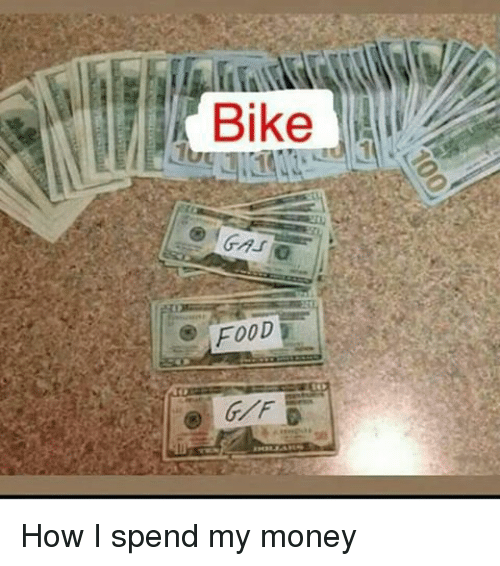 https://me.me/t/bike-gif
https://me.me/t/bike-gif
Blaspheme!!
You may be sitting there with your jaw in your double espresso thinking “Who the hell is this guy?!?!? CLEARLY he doesn’t get what the “cycling life” is all about… didn’t he read Phil Gaimons book???”
Yes, I read the book. Yes, I’m a cyclist. Yes, I no longer spend all my money on bike shit.
And here is why you shouldn’t either.
Let’s make one thing crystal clear first: I am in no way a financial specialist or expert, nor am I receiving any payment for writing this piece. Over the last 10+ years of coaching cyclists & triathletes, I’ve realized that only a tiny, tiny segment of riders and triathletes ages 18-45 are saving for retirement, and many are spending as much of their money as possible on bike related stuff, instead of having a long-term view. This is simply a post trying to help others get on track to enjoy things down the road, by taking small, easy actions now.
Cycling is quickly becoming one of the sports outside of golf where much business and networking occurs. It’s funny that so many cyclists are broke, or simply “in between buying new bike stuff”, as some of my friends and athletes would say, yet many riders are closing business deals of all sizes while riding. Talk about a juxtaposition.
So why should you stop buying new parts and stuff for your bikes, buying more stuff for riding and racing your bikes?
Because your retirement won’t save for itself.
Yes I used the “R” word…But hear me out, this isn’t a post that will make your eyes glaze over, or give you a massive migraine. We’ll keep this short and simple, with a few SIMPLE and EASY actions that you’ll take today.
Let’s start with Why
Why should you care about you retirement? Well, aside from the obvious answer of you may or may not want to HAVE to work for the rest of your life, let’s think about a real example:
Think about the “old fast dude” who is always super chill, and who rolls up every 6-12 months to the group ride on a new top of the line Colnago, Pinarello, or whatever bike that you’re drooling over and constantly trying to draft behinds so you can see it up close.
Don’t you want to 1. Be that FAST when you reach his age? 2. Not have to think twice to purchase a bike like that when you’re older? 3. Be that relaxed and chill while enjoying life?
 http://www.plannersearch.org/assets/images/lifeevents/v-636038507242352597/184.jpg
http://www.plannersearch.org/assets/images/lifeevents/v-636038507242352597/184.jpg
Thought so.
We ALL want to be FAST, FIT, forever CHILL, and have a beautiful stallion as we ride more and get older. But as of right this second, every penny you earn is going towards the “right now, right here”…who’s taking care of yourself for 30 years from now? Sure riding and fitness are constantly on your mind, but what about your financial health?
While you may be fast on the bike, when it comes to saving for your retirement you’re still in your car trying to put on your bibs with your towel wrapped around your waist and legs while the race is already ⅓ to halfway over……Let’s change what you’re doing now, so you can start making some major improvements in your FTP for your retirement fund.
LEARN MORE
If you’re one to read, you can pick up one of the following books which won’t bore you to tears, and will give you REAL, EASY, ACTIONABLE steps to help you get on track to enjoying being “That old fast guy with a sick bike, and legs to back it up.”
1. I will teach you to be rich by Ramit Sethi- Targeted to 20-30-somethings, this book is fantastic for those who want a plan that they can automate, set, and forget. This book is written in basic english, so you understand what’s going on. It’s set up in a 6 week plan, so you can read a little each week, take an action step, and have everything good to go without a second thought.
2. The little book of common sense investing by Jack Bogle- This is for all ages, who are looking to cut the crap, and get down to brass tacks. A quick read, you’ll be left wondering how it could be this simple, and why you didn’t start sooner.
3. A simple path to wealth by JL Collins- Similar to I will Teach you to be rich, this book is for those in their mid 30’s-50’s, written in simple terms, and easy to understand.
4. A random walk down wall street by Burton Malkiel- This one is more for those who really enjoy learning about a topic so they understand it beyond the surface. Perhaps this could be called the “Textbook for investing” for modern times, this book helps you make sense of investing, the terminology, and start to explore the world of finance on a more serious level.
Your 401(k) isn’t as good as you think it is….
While many of us have our retirement savings “all taken care of” by the 401(k) offered by our companies, these are often riddled with hidden fees that suck out much of the growth from the money we do invest. Do your research and find out how much you’re paying in fees. As “Small” as 2.5% per year in fees can have a devastating effect on your retirement fund. We’re talking about eating away at well over 35-40% of what you COULD end up with, if you did your homework to find the best possible low-cost/low-fee 401(k)…..YES, you have the right to do so! Don’t be surprised to find that many of the fees are hidden in “legalese”, let alone deep within 60+ page documents.
To learn more about the 401(k) hidden fees and retirement funds, you can watch the Frontline Special “The Retirement Gamble”. It’s a great look at what’s really going on with retirement funds, and people like you and me.
How to get started, TODAY
If you’re not one to read books and just want a few core principles, it comes down to these 3 basic things:
- It really can be as simple as taking 5-10% of your pay each month, and automatically transferring it over to an investment house that offers low-fee index funds, such as Vanguard or Dimensional Fund Advisors.
While many of us barely have time to get our riding in, let alone even THINK about investing, Vanguard and Dimensional Fund Advisors offer some pretty solid “set it and forget it” kind of funds, such as the Target Date Funds (TDF’s) where you invest in a fund that will automatically rebalance your investment portfolio as you get closer to your retirement date. As always, do your own research, and consult with a professional to make sure you get it right for you and your situation.
You can Open an investing account for FREE here:
https://personal.vanguard.com/open-account/oax/app/triage#/
Vanguard is my personal choice, as there are no fees to invest/purchase, and as you accrue more money into a specific fund, thresholds are met that drop the costs down even further.
Again, I’m not a finance expert, so take this with a grain of salt: I’d personally start with a Roth IRA (Independent Retirement Account), as you pay taxes now (known rates) so the money you accrue is ALL yours, and not 50%+ going to Uncle Sam when you go to draw it out (or at some absurdly higher tax rate that we could never guess). Look into the rules and regulations that apply to Roth IRA’s as you won’t be able to easily dip into the account if you need some cash between now and retirement, and there are also maximum amounts you can put into the account each year, etc.
Check out I will teach you to be rich by Ramit Sethi for more on how to do this.
2. The sooner you get started, the better off you’ll be- Let’s just say that Compounding Interest is a fantastic invention, but one that you can’t take advantage of unless you’re investing! If you’re in your early 20’s CONGRATS! Even “just” $150 a month can grow to significant amounts by the time you’re in your 50’s, and really put you ahead of the game!
If you’re thinking “I don’t have $150 a month to put away”, then start with $50, or $20 and work your way up. These small amounts, with the help of compounding, give you a big leg up in the long run, and set you up to make bigger contributions as you get older, with far less pain.
Don’t make the same mistake I did, and keep telling yourself “I can’t afford it”. (I missed out on probably a once in a lifetime opportunity of getting into investing for retirement during the 2008 financial market collapse. Not because I was afraid, but because I kept telling myself that I couldn’t set aside $50 a month…boy do I regret that. But live and learn!) Automate small amounts to come out from your paycheck each month so they’re automatically invested, and you’ll make it much less painful.
STILL struggling to make it happen? Treat it like a tax. You’ll learn how to adjust and live within your new earnings because when it comes to taxes, you don’t have a choice but to pay them. Aim for 10% of your monthly pay as a good starting point.
3. Play the long game- Don’t get into any of this day trading stuff that is super risky, and takes a lot of time/effort. Indexing and using low-fee index funds makes the game a lot simpler, puts the odds far more in your favor…so much so that the world’s top Investors like Warren Buffet recommend it for the average investor!
Why take a guess/gamble on which company will be the next Apple or Amazon, and instead own them all!
A portfolio as simple as a low-fee S&P 500 Index along with a Total Bond Market Index and Treasury Inflation Protected Securities (TIPS) may be enough to have you rolling. Talk with a Financial Fiduciary to help you determine the proportions of your portfolio, as this can have a big impact on your performance. NEVER go all-stocks, or all-bonds! If you’re not sure what to do, you can go 50-50 (That’s 50% S&P 500 Index, and 50% bonds made up of Total Bond Market Index and TIPS).
If you want some help to figure out what’s best for you, you should seek out a Financial Fiduciary- this is super important, as fiduciaries are required to put YOUR needs first and foremost. You must make sure to differentiate between a financial broker and a 100% Fiduciary. Always ask first, making sure they don’t have any secondary motives, such as receiving kickbacks/commissions for your purchasing specific funds. That’s a conflict of interest, and well, ruins the whole fiduciary thing.
If you’d like to learn more, check out the books above, or, if you’d like a longer read, you can pick up a copy of Tony Robbin’s “Money, Master the game”.
Either way, get started NOW- even with seemingly small amounts- as time and compounding interest are your friends as you move forward. But you have to get started to take advantage!
Ignoring saving and investing for your retirement is like heading to the start line of your peak race with 2 flat tires, a rusty drive train, and the brakes locked up. You can work really hard, but you’re clearly at a huge disadvantage, and won’t win.
Not the post you expected from a cycling coach, huh?
Life INCLUDES the bike, but we must make sure to keep a healthy balance.
Tell me, do you invest? Have you started to build up your Retirement fund, or are you still putting it off?
What’s keeping you from getting started?






